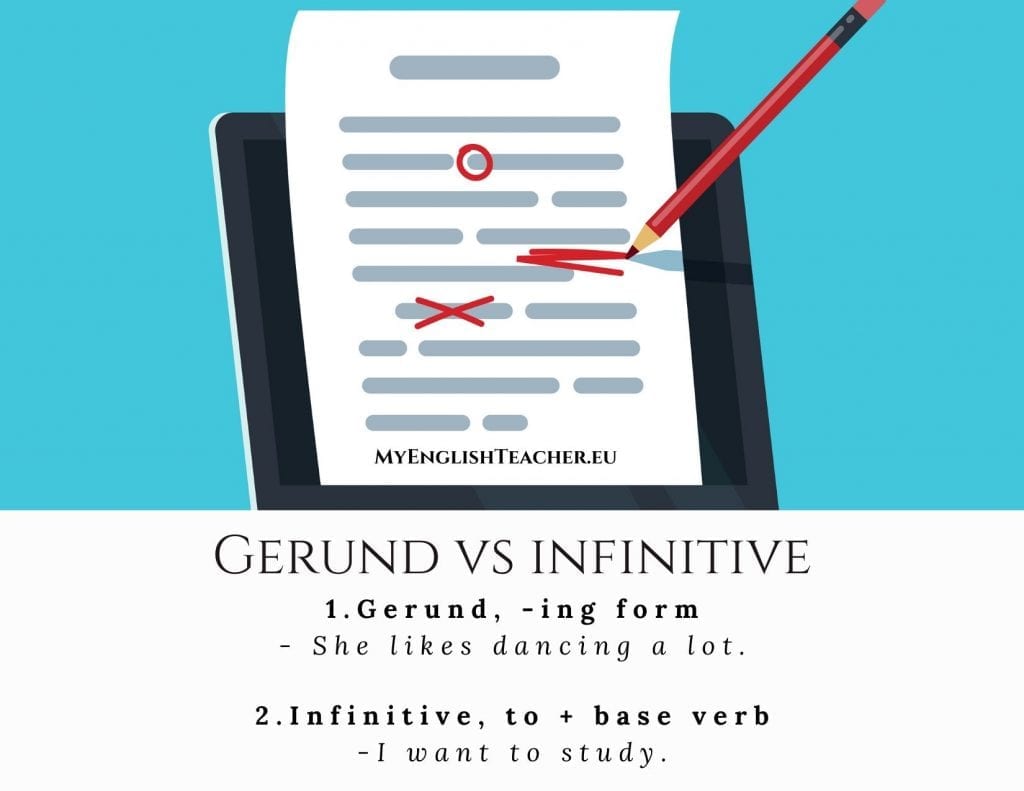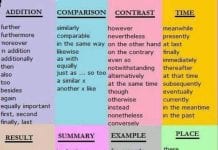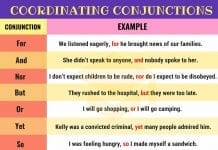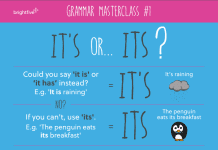
Gerund or Infinitive?
Gerund, -ing form
Gerund is a verb form that has the ending –ing.
- She likes dancing a lot.
- My hobby is painting.
Infinitive, to + base verb
The infinitive form is the base form of a verb with ‘to’. It is used after another verb, after an adjective or noun or as the subject or object of a sentence.
- I want to study.
- It’s difficult to understand.
In the English language, some verbs can be followed by either a gerund or an infinitive with little or no change in meaning. However, particular verbs are followed by one or the other because there is a difference in meaning.
For example:
remember + -ing
- I remembered locking the door.
The sentence above means that you had locked the door and that you remembered the fact that you did that.
remember + infinitive
- I remembered to lock the door.
The sentence above means that I did not forget that I needed to lock the door. The remembered came before the action.
regret + -ing
- I regret saying that I don’t like your new girlfriend.
The sentence above refers to something you did in the past which you now wish you hadn’t done.
regret + infinitive
- I regret to inform/tell you that we have decided not to offer you the job.
I regret to inform/tell/say is a way of introducing bad news and means unfortunately.
forget + -ing
- I’ll never forget seeing the Acropolis for the first time.
never forget seeing means that I saw the Acropolis and the memory will always be with me.
forget + infinitive
- She was angry with him because he forgot to pay the bill.
forgot to pay means that he did not pay the bill because he did not remember.
try + -ing
- Have you tried using another washing detergent?
try + -ing is used when we mean to experiment not necessarily successfully.
try + infinitive
- I tried to be on time, but I was stuck in traffic.
I attempted to do something, I did my best.
stop + -ing
- They stopped going out in the evening when they had their first child.
stop going implies that they used to go out a lot but no longer do so.
stop + infinitive
- I think we ought to stop to have something to eat soon.
stop to have implies that we are going somewhere, perhaps driving along a motorway, and need to stop driving in order to have something to eat.
went on + -ing
- He went on talking about himself for hours and hours.
went on talking means that he continued talking without stopping.
went on + infinitive
- She admitted her company’s responsibility for the disaster and went on to explain how compensation would be paid to the victims.
went on to explain means that she explained about how compensation would be paid to the victims subsequently.
dread + -ing
- He dreaded having to ring her because he knows she’s going to be furious with him.
dreaded having to ring means the opposite of look forward to.
I dread to think
- I dread to think what he will do when he finds out that you have decided to leave him.
I dread to think means I don’t want to think and is often used to talk about a reaction that is likely to be negative or hostile.
need + -ing
- Your room needs brightening up a bit.
The verb need has a passive meaning when it is followed by a gerund. Here it means needs to be brightened, which is also possible.
need + infinitive
- I need to have a word with you. It’s about your attitude towards your brother.
need + infinitive is the most common form of the verb need and expresses necessity.
mean + -ing
- If we want to catch the 7.30 train, it’ll mean leaving the house at 6.00.
it’ll mean leaving means it will entail/involve leaving the house at 6.00’ or that leaving the house at 6.00 will be a consequence of catching the 7.30 train.
mean + to + infinitive
- I meant to send you an SMS, but I never got round to it.
meant to send means intended to write.
help + -ing
- I can’t help feeling that you are making a wrong decision.
I can’t help feeling means I can’t stop myself feeling.
help + to + infinitive
- Everyone helped to make her feel as welcome as possible.
Here helped means assisted.
As explained above, one can conclude that certain verbs must be followed by either a gerund or an infinitive because the meaning changes when one or the other is used.
More for you:
List of Verbs Followed by Both Gerunds and Infinitives!
200 Most Common Irregular Verbs + Gerund
List of Verbs Followed by ING Form or Infinitive!
What is the difference between the infinitive and the bare infinitive
























hi i am student and study english in iran my teacher said about gerund and infinitive but i search more . you are good thank you
Thank you so much! Nice to hear from you!